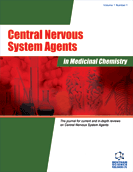-
s Aging Affects Nicotinic Acetylcholine Receptors in Brain
- Source: Central Nervous System Agents in Medicinal Chemistry, Volume 19, Issue 2, Aug 2019, p. 119 - 124
-
- 01 Aug 2019
Abstract
Background: Aging is a common and inevitable stage in the life cycle of higher organisms. Different organs, including the central nervous system, are affected by aging in different ways. Many processes are involved in aging, and neurodegeneration is one of the aging processes in which the central nervous system is engaged. Brain degeneration during normal aging underlies cognitive disorders experienced by older people. Not all molecular mechanisms associated with age-related neurodegeneration are fully understood; however, there is a whole range of data on the participation of nicotinic acetylcholine receptors in the processes of aging and neurodegeneration. Two main subtypes of nicotinic acetylcholine receptor α7 and α4β2 present in the central nervous system are affected by these processes. The loss of these receptor subtypes during normal aging is one of the reasons for the cognitive impairments. The decrease in nicotinic acetylcholine receptors is also very important for the pathogenesis of age-related neurodegenerative diseases. Thus, the drugs enhancing receptor functions may be considered promising for the treatment of cognitive dysfunction in the aged people. Conclusion: To achieve healthy longevity, the molecular processes that occur during aging should be established. In this regard, the participation and role of nicotinic acetylcholine receptors in the brain aging and degeneration are considered in this review.


